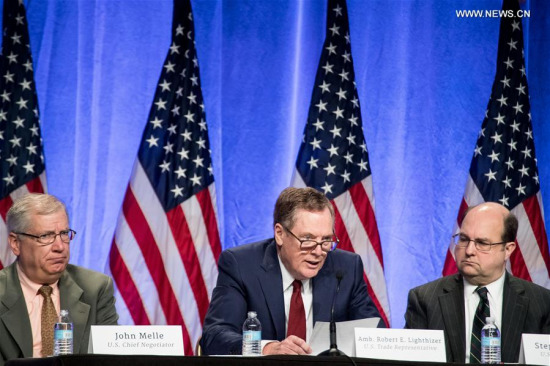
U.S. Trade Representative Robert Lighthizer (C) attends the first round of renegotiations on the North American Free Trade Agreement (NAFTA) in Washington D.C., the United States, on Aug. 16, 2017.(Xinhua/Ting Shen)
The United States, Canada and Mexico on Wednesday kicked off here the first round of renegotiations on the North American Free Trade Agreement (NAFTA) amid widespread uncertainty and anxiety over the future of the decades-old trilateral trade deal.
"We all agree that NAFTA needs updating. This is a 23-year-old agreement and our economies are very different than they were in the 1990s," U.S. Trade Representative (USTR) Robert Lighthizer said in his opening remarks for the inaugural round of NAFTA talks, which will last until Sunday in Washington D.C.
"We need to modernize or create provisions which protect digital trade and service trade, e-commerce, update customs procedures, protect intellectual property, improving energy provisions, enhance transparency rules and promote science-based agricultural trade," Lighthizer said.
He hoped that the three countries could develop model provisions in each of these areas that can be used for years ahead and have the flexibility to adapt to future innovations.
Lighthizer also claimed that NAFTA "has fundamentally failed many, many Americans", and the United States "cannot ignore the huge trade deficits, the lost manufacturing jobs, the businesses that have closed or moved" because of incentives in the current agreement.
The top U.S. trade official said President Donald Trump, who has threatened to quit NAFTA, was not interested in "a mere tweaking of a few provisions and a couple of updated chapters," and the United States would seek "major improvement" of the agreement.
"We need to assure that huge trade deficits do not continue and we have balance and reciprocity. This should be periodically reviewed," Lighthizer said.
In July, the USTR's office for the first time included deficit reduction as a specific objective for the NAFTA negotiations, reflecting the Trump administration's determination to address the issue.
However, Canadian Foreign Minister Chrystia Freeland dismissed the use of trade deficits as indicators of the success of a trade agreement.
"Canada doesn't view trade surpluses or deficits as a primary measure of whether a trading relationship works," Freeland said in her opening remarks, adding current trade between the U.S. and Canada is "balanced and mutually beneficial."
Lighthizer said the U.S. would also seek to tighten the rules of origin for automobiles and auto parts by requiring a higher NAFTA content and "substantial U.S. content" .
The existing rules of origin allows the autos with a regional value content of 62.5 percent or higher to qualify for shipping them duty-free in North America. That's already the highest among the 12 free trade agreements that the U.S. currently has, according to Matt Blunt, head of American Automotive Policy Council.
Blunt said the current threshold for local content requirement strikes the right balance, warning that tightening the rules of origin in NAFTA could be disruptive and hurt the competitiveness of automakers in U.S., Canada and Mexico.
Mexico's Economy Minister Ildefonso Guajardo, in his opening remarks, said objectives for NAFTA renegotiations should be to "have more trade" and "do no harm."
"The issue is not tearing apart what has worked, but rather how we can make the agreement work better," Guajardo said, adding negotiators have to work with all participants for successfully reaching a deal.
Jeffrey Schott, a trade expert and senior fellow at the Peterson Institute for International Economics, a Washington-D.C. based think tank, said many U.S. lawmakers are also very reluctant to see major changes to NAFTA because of potential losses or uncertainty over the renegotiations.
"If you ask many of the members, they will say that their constituents have benefited from the NAFTA and they're very reluctant to change what is going on now in part because they know the potential losses," Schott told Xinhua.
"If they don't know what the potential losses are, they are concerned that there will be increased uncertainty and that would be a negative factor for investment," he said.
Schott expected that negotiators from the U.S., Canada and Mexico would table negotiating proposals for a variety of different issues at this week's round of talks.
"I think there will be a lot of proposals put on the table, detailed texts on a variety of different issues, and a lot of time will be needed just to explain what each country wants to see in this modernization of the NAFTA," he said.
It's still early to say whether the three countries would reach an upgraded trilateral trade deal or the negotiations could break down.
While every member has the option to withdraw from NAFTA six months after it provides the written notice to the other parties, Schott warned the costs of breaking up would be very high "because the economic disruptions to all three economies would be very severe."
"If the U.S. withdrew it, it would cause significant pain for many U.S. exporters including many farmers that rely on the Mexican market for a large share of their crop sales," he said.


















































